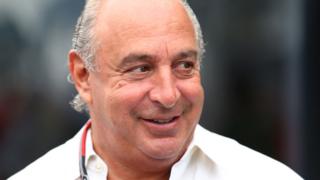 Image copyright
Getty Images
Image copyright
Getty Images
Sir Philip Green's legal action against the Daily Telegraph has been formally ended by a High Court judge.
The Topshop boss had gagged the newspaper from publishing allegations of misconduct against five employees.
He had said he wanted to drop the case because it was "pointless" after he was named in Parliament as the businessman behind the injunction.
Sir Philip said he was pleased with the judgement, and said the Daily Telegraph had pursued a "vendetta" against him.
Sir Philip denies allegations he behaved wrongly.
In a ruling on Friday, Mr Justice Warby granted the Topshop owner permission to discontinue the proceedings.
The newspaper had intended to publish allegations of misconduct made against Sir Philip by the employees - who all received substantial payments after settling their claims in return for saying no more about them - under non-disclosure agreements (NDAs).
The Telegraph now intends to publish details of the claims made against him in the coming days.
The paper says Sir Philip faces a legal bill of £3m, some of which includes the Daily Telegraph's own costs.
The paper says the judge ordered the billionaire to pay the "bulk" of these.
How did this start?
Last August, the Daily Telegraph planned to run a story of allegations of misconduct made against Sir Philip by five employees.
Sir Philip approached the court to stop it naming him.
Initially, the court refused, but Sir Philip appealed and it did grant an injunction, saying there was a "real prospect" that publication would cause "substantial and possibly irreversible harm" to the claimants.
It then ran a story saying simply that a "leading businessman" was involved in a number of NDAs with former employees.
However, Sir Philip was named by Lord Hain in the House of Lords two days after the court's ruling.
Who is Sir Philip Green?
Sir Philip used to be known as the king of the High Street.
He built a fortune from a retail empire that included Topshop, BHS, Burton and Miss Selfridge.
He sold BHS in March 2015 for £1, but it went into administration a year later, leaving a £571m hole in its pension fund.
He later agreed a £363m cash settlement with the Pensions Regulator to plug the gap.
In a report into the collapse of BHS, MPs called the episode "the unacceptable face of capitalism".
He and his wife Cristina are estimated by Forbes to be worth £3.8bn.